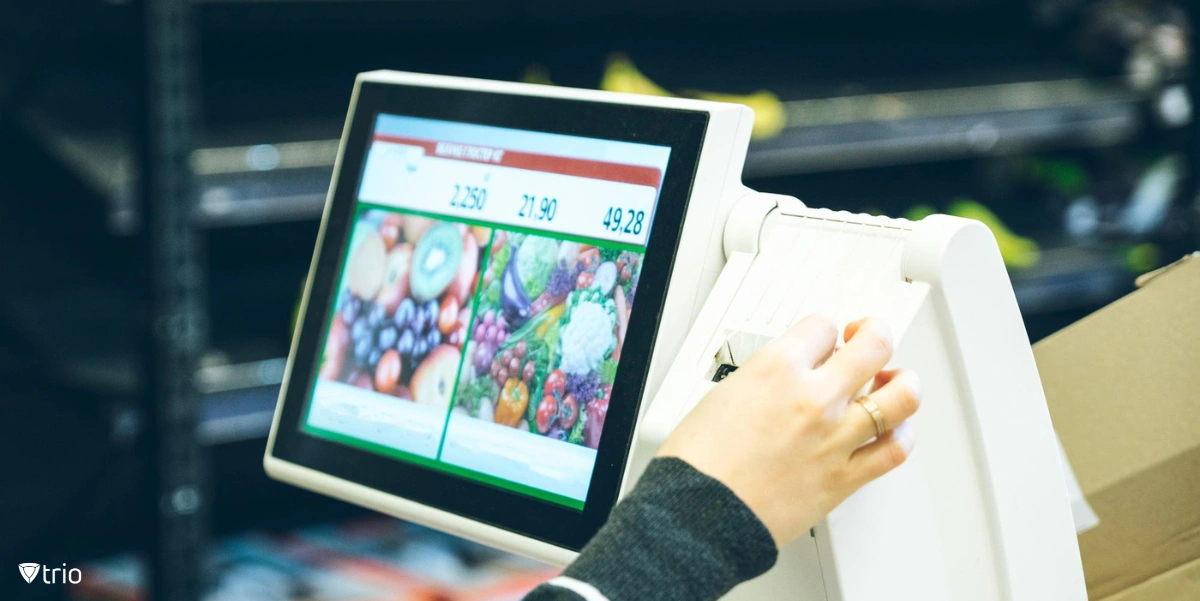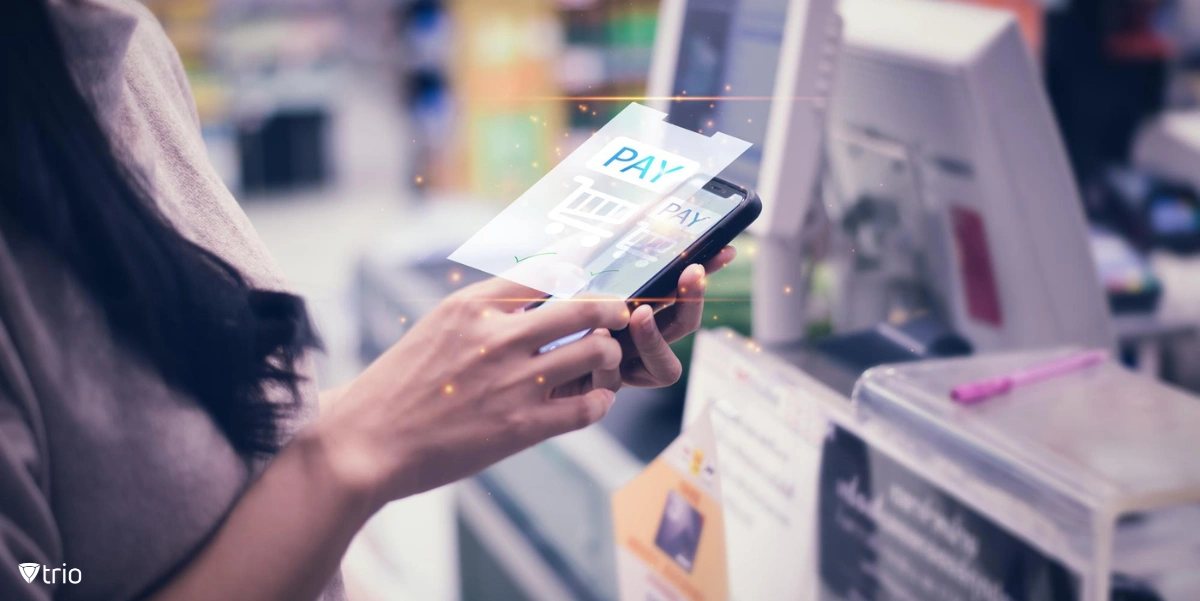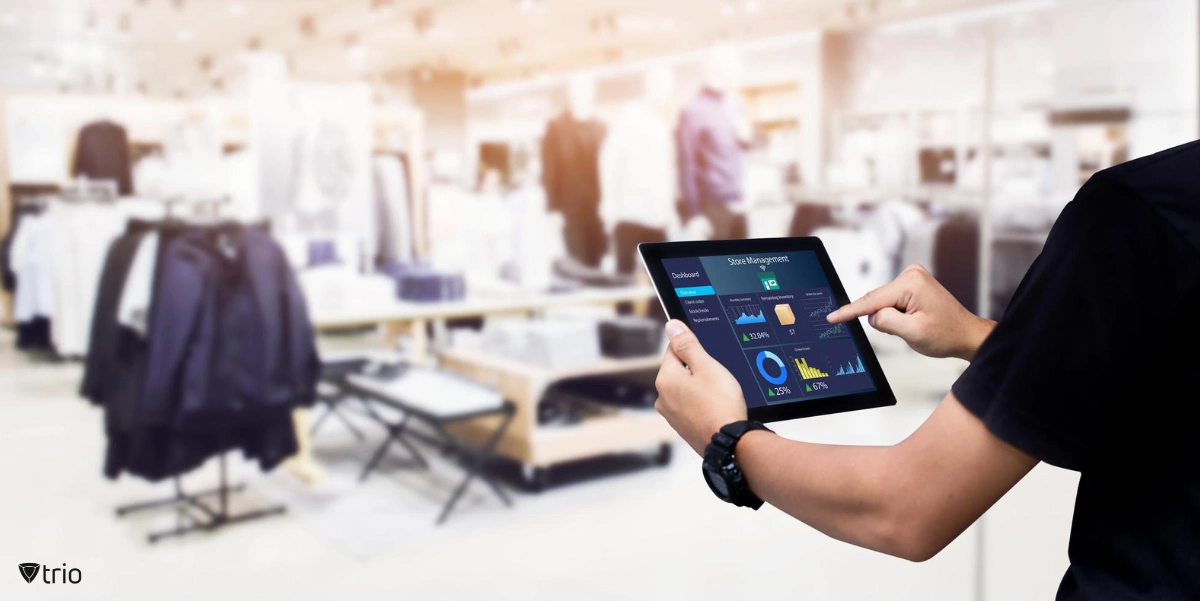In today’s technology-driven market, smart retail is changing the shopping experience. Combining cutting-edge technologies such as the Internet of Things (IoT), Artificial Intelligence (AI), and Mobile Device Management (MDM), smart retail promises to transform traditional retail by enhancing operational efficiency and providing a personalized shopping journey. This blog explores the various facets of smart retail, demonstrating how it integrates various technologies to simplify operations and boost customer satisfaction.
What is Smart Retail?
Smart retail represents a modern approach to commerce, where technology and data converge to enhance both the shopping experience and business operations. This innovative retail concept uses various technologies, including Artificial Intelligence (AI), the Internet of Things (IoT), and big data analytics to create a flawless, efficient, and personalized shopping environment. Here are the core components of smart retail solutions:
- Digital Signage: These are interactive screens that display product information, offers, and advertisements, adjusting content in real-time based on viewer interest and demographics.
- Smart Shelves: Equipped with weight sensors and RFID tags, smart shelves can automatically monitor inventory levels and gather data on product popularity or shopping patterns.
- Mobile Checkout Systems: Reducing queues and enhancing customer convenience, these systems allow shoppers to pay for items using their smartphones, bypassing traditional checkout lanes.
A smart retailer understands the importance of secure and efficient operations. In fact, the integration of these technologies not only streamlines operations but also provides a richer, more engaging customer experience. Smart retailing involves leveraging these technologies to simplify operations and enhance the customer shopping experience. Furthermore, choosing advanced smart retail software will help the businesses to optimize operations and enhance customer interactions.

The Role of IoT in Smart Retail
The Internet of Things (IoT) plays a pivotal role in transforming traditional retail operations into dynamic, responsive, and customer-centric environments. For example, leading retailers are using smart retail technology such as IoT-connected shelves as key components of their smart retail strategies. Here’s how IoT is redefining the retail industry:
- Real-time Data Gathering: IoT devices in retail settings, such as sensors and smart shelves, continuously collect data on product availability, customer traffic patterns, and even shopper preferences. These devices provide valuable insights that are not possible with traditional retail setups.
- Enhanced Customer Insights: Through data collected by IoT devices, retailers can understand customer behaviors and preferences more deeply. This data is crucial for personalizing marketing efforts and improving product placement, leading to a more customized shopping experience.
- Automated Inventory Management: One of the significant trends in IoT for retail is the automation of inventory management. IoT systems can track inventory levels in real-time, automatically reorder products, and even predict future inventory needs based on historical data. This reduces the likelihood of stockouts or overstock situations and optimizes the supply chain efficiency.
- Enhanced Customer Interactions: IoT enables stores to interact with customers in real-time using their mobile devices. For example, when a customer approaches a product, IoT sensors can start personalized promotions or detailed product information directly to the customer’s smartphone, enhancing engagement and potentially increasing sales.
- Streamlined Operations: IoT devices simplify operations by automating routine tasks, such as tracking goods, updating prices, and monitoring store conditions. This automation allows staff to focus on more critical customer service tasks, improving operational efficiency.
The integration of IoT in retail is not just about technology; it’s about preparing a more responsive and engaging shopping experience that can lead to increased customer loyalty and sales. Smart retail examples illustrate the transformative impact of technology in retail settings. For instance, stores utilizing digital signs to offer personalized promotions or smart shelves to manage inventory show how these innovations create a more engaging and efficient shopping experience.

AI’s Impact on Smart Retail
The integration of Artificial Intelligence (AI) in retail, particularly within the smart retail sector, is changing how businesses understand customer behavior, manage inventory, and marketing strategies. In the following, we explain how AI is making these advancements possible:
- AI’s Role in Predicting Customer Behavior: AI technologies use big data analytics to understand and predict customer buying patterns and preferences. By analyzing vast amounts of data from various sources—including past purchases, browsing history, and customer interactions—AI models can identify trends and predict future buying behaviors. This predictive capability allows retailers to customize their offerings and improve customer engagement by presenting products and promotions that are most relevant to individual consumers.
- AI-Driven Inventory and Supply Chain Management: Effective inventory management is essential in retail to ensure that supply meets demand without overstocking or stockouts. AI enhances this aspect by providing precise demand forecasting. For instance, AI systems analyze sales data in real-time, adjusting inventory levels based on predicted future sales. This dynamic approach reduces waste, decreases the cost of storage, and improves cash flow. Furthermore, AI can optimize the supply chain by predicting the best times to reorder products, selecting optimal delivery routes, and identifying potential downturns before they cause issues.
- Personalization of Marketing Efforts: AI also plays a crucial role in personalizing marketing efforts. Through machine learning algorithms, retailers can create personalized shopping experiences by recommending products uniquely suited to each customer’s preferences. This enhances customer satisfaction and increases the likelihood of purchases.
Enhancing Smart Retail with Mobile Device Management
Mobile Device Management (MDM) plays a key role in enhancing operational efficiency and securing customer interactions. We discuss how integrating MDM solutions can transform the retail environment in the following:
- Streamlining Device Operations: MDM solutions are crucial in retail settings where multiple devices, such as tablets, mobile POS systems, and inventory scanners, are in constant use. By centralizing the management of these devices, MDM ensures that all endpoints are configured uniformly, up to date, and optimized for performance. This uniformity reduces device downtime and maintenance overhead, allowing retail staff to focus more on customer service rather than technical issues. Moreover, MDM can remotely install and update applications across all devices simultaneously, ensuring that every touchpoint offers the latest features and security updates to customers and staff.
- Enhancing Security Across Retail Networks: Security is crucial in the retail sector, especially with the growing use of mobile devices that access sensitive payment and personal data. MDM enhances security by implementing strong authentication protocols and encryption across devices. If a device is lost or stolen, MDM software can remotely lock or wipe the device, thus protecting sensitive data from unauthorized access. This capability is essential not only for safeguarding customer trust but also for complying with strict data protection regulations.
- Supporting Other Smart Retail Technologies: MDM manages and secures devices and supports other smart retail technologies like IoT and AI by ensuring these devices are part of a secured, managed network. For example, in environments where IoT devices monitor customer movements and preferences, MDM can ensure these devices are functioning correctly, have the necessary updates, and are secure from potential cyber threats. This support is crucial for maintaining the integrity and reliability of data-driven insights used to enhance the shopping experience.
By integrating MDM into their operations, retailers can ensure a seamless, secure, and highly efficient environment that enhances both the employee and customer experience. The ability to manage devices efficiently, protect customer information, and support advanced technologies makes MDM an essential tool in smart retail.
Conclusion
Smart retail is reshaping the retail outlook, combining advanced technologies such as IoT, AI, and MDM to improve customer engagement and simplify operations. This transformation boosts the consumer experience and optimizes business processes to meet the challenges of the digital era. According to this insight, as retailers continue to innovate, the integration of these technologies becomes critical to maintaining competitive advantage and driving growth.
See Trio in Action: Get Your Free Trial Now!
To further strengthen this digital transformation, leveraging solutions like Trio can provide an added layer of efficiency and security. Trio’s robust MDM capabilities ensure that every device, whether it’s for customer interaction or operational efficiency, is securely managed and seamlessly integrated with other smart retail technologies. This ensures a secure environment, enhancing both the employee and customer experience. Try Trio’s free demo today to see how it can transform your retail operations and help you lead in the smart retail space.
Get Ahead of the Curve
Every organization today needs a solution to automate time-consuming tasks and strengthen security.
Without the right tools, manual processes drain resources and leave gaps in protection. Trio MDM is designed to solve this problem, automating key tasks, boosting security, and ensuring compliance with ease.
Don't let inefficiencies hold you back. Learn how Trio MDM can revolutionize your IT operations or request a free trial today!




